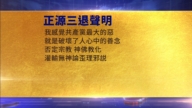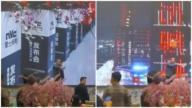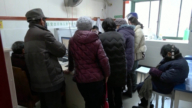【新唐人2013年01月23日訊】近年來中共政權的合法性越來越受到質疑,中國民眾對於中共官員權力不受監督和制約,所造成的集體貪腐淫亂深惡痛絕,除不斷爆發底層民眾的抗暴事件,中產階層要求官員信息透明的呼聲也越來越高。美國媒體指出,這種呼聲對一黨專政構成了本質上的挑戰。
新年伊始,中國南部的廣州爆發了反審查街頭示威,隨後,北方地區空氣污染引發了網上強烈抗議,山西工廠洩露的有毒化學物質也在周邊城市引起了恐慌,網民在網上要求政府如實公布自來水的質量,在北京飲用水安全部門工作的研究員夫婦指稱,他們了解幕後數據,20年來從不喝一滴自來水。民眾這些年來積壓在心頭的不滿情緒日益升級。
《紐約時報》指出,多年來,很多觀察人士堅稱,中共威權體制之所以能夠維持,是因為民眾與中共做了一筆大交易:中共負責保證經濟增長,人民則不得過問他們的統治模式。現在,因為經濟發展而提高了生活水平的很多人,都開始終結他們與政府的協議,表達意願的方式也比以往任何時候都更加大膽。這群人中既有億萬富翁也有學生,既有影視明星也有家庭主婦。而發起挑戰的人大多都曾是中共最熱心的支持者,也就是那些受益於30年經濟發展的中產階級與富裕家庭。
房地產巨頭潘石屹是引領變革呼聲者的人之一,他要求政府公開空氣中潛在的致命顆粒物PM2.5水平,並推動官方公布74個城市PM2.5水平的決定。
中國公民監政會發起人郭永豐:「只要是有些良知,他方便在底下這個微博經常說真話,越來越多的人說真話,喚醒了很多有良知的人,原來都不敢說,現在都敢說了,越來越多的人已經認識了社會的弊病,也對這個社會覺得有義務有責任了,其中也有些中產階級。」
《紐約時報》指稱,倡導推翻共產黨的人寥寥無幾,很多人只是希望當局能為人們的生活安全提供更多保障,但是他們要求的透明度,對這個一黨專政的國家發出了本質上的挑戰。
郭永豐認為,潘石屹和任志強等一少部分富人,他們的民主思想已經非常到位,他雖然沒有直接要求中共下臺,但是他們在網路上影響非常大,對推倒中共紅牆起到了作用。
郭永豐:「共產黨一黨專政結束是遲早的事,就是看甚麼時候,網路上民意的閥門已經打開了,就看實踐性,現在很多人在搞『飯醉』,『同城飯醉』,就是變相的聚會,在網上認識,網上聚會。」
時政評論家藍述指出,中共為了維持獨裁統治,篡權後把中國人搞得一窮二白,在他們統治遭遇危機時又搞起了所謂改革開放,在這種情況下形成的中產階級,要求民主自由是自然而然的。
時政評論家藍述:「人有三個權力應該得到保證的。一個是生存的權力,一個是追求幸福的權力,另外一個就是自由的權力。那麼把這三個權力跟中國現在形成的中產階級你去做一個比較,就不難得出結論。因為這些人生存的權力已經有了,追求幸福的權力他也有了,剩下的一個就是自由的權力。」
不過藍述認為,大多數中產階級,不願意冒險失去他們大半生經營所得到的財富,普遍比較膽小。但是他們中只要有少部分能走出來和中國的中下層聯合,就能起到足夠的作用。
藍述:「但是他只需要有一部分,比較有理想,對外面的社會比較了解,對中國歷史比較有研究的這批人,數量非常少的這一批中產階級,他能夠和衝擊中共目前極權的中下層主流結合在一起,就能完成開創中國新時代這麼一個局面。」
報導指出,有些中國人,尤其是年輕一代人,都開始意識到安全的生活不只是有賴於政府對人們物質需求的滿足,還有賴於捍衛一系列原則,其中最重要的是言論自由。如果執政黨無法自律,人們就要對他們進行監督。
採訪編輯/劉惠 後製/君卓
Middle-Class Joined to Challenge the CCP Regime
Recently, more and more doubts are being expressed on
the legitimacy of Chinese Communist Party’ (CCP) regime.
Chinese people deeply hate CCP officials’ unsupervised
and unrestrained collective corruption and promiscuousness.
In addition to grassroots people’s uprising events, now
the middle class is also raising its voice, asking officials to declare their properties publicly.
U.S. media point out that this voice is essentially
a challenge to the one-party dictatorship.
At the beginning of this year, anti-censorship demonstrations
broke out on the streets of Guangzhou in southern China.
They were followed by strong online protests
against air pollution in the northern regions.
Shanxi plant leaking toxic chemicals
also caused panic in the surrounding cities.
Netizens demanded from the government to publish
data about the quality of the drinking water.
A couple, researchers in Beijing’s drinking water security
sector, disclosed they have not drunk tap water in 20 years, as they are aware of the behind-the-scenes data.
The discontent people have all these years
keeps escalating.
The New York Times pointed out that over the years
many observers have insisted Chinese people made a deal with the CCP to maintain its authoritarian regime:
CCP is responsible to ensure economic growth,
and people do not question their rule.
Now many, whose living standard has improved with the
economic growth, are ending their agreement with the CCP.
They are more daring than ever before
in expressing their opinions.
This group includes people from billionaires to students,
from movie stars to housewives.
Those who initiated the challenge are mostly
the once enthusiastic CCP supporters,
the middle-class and wealthy families,
who benefit from the 30-year economic development.
Real estate tycoon Pan Shiqi is one of those,
who appeal for changes.
He asked the government to publish the data about the
potentially fatal air pollution of level PM2.5, and prompted the officials to admit the existing PM2.5 in 74 cities.
Guo Yongfeng, founder of Chinese Citizens Monitoring
Council: “As long as one has a conscience and a channel to tell the truth via microblog,
then more and more people
will be telling the truth to awake others.
Those who dared not say anything before,
are speaking up now.
More and more people have recognized the social issues
and feel the sense of responsibility. Some of them are from the middle class."
The New York Times alleged that few advocate
overthrowing the CCP.
A lot of people just want the authorities to provide
more protection for the safety of people’s lives.
But they are asking for transparency,
which is an essential challenge to the one-party dictatorship.
Guo Yongfeng thinks a small number of rich people like
Pan Shiyi and Ren Zhiqiang have matured democratically.
Although they do not ask the CCP to step down directly,
they have large impact on the internet and have played a role in the fall of CCP’s red walls.
Guo Yongfeng: “The CCP one-party dictatorship will end
sooner or later, the question is when it will happen.
Now public opinions are open on the internet.
Many people are now gathering and socializing online.”
Commentator Lan pointed out that in order to maintain
its dictatorship, the CCP made China extremely poor.
And started the so-called reform
when it was facing a crisis.
It is natural for the middle-class formed in this situation
to call for democracy and freedom.
Lan Shu: “Human beings have three guaranteed rights.
The right to live, to be happy, and to be free.
The middle-class in China now has the right to live,
to pursue happiness, the only one left is the freedom."
But Lan thinks the majority of the middle class people
don’t want to risk the wealth, gathered throughout their lives.
However, it will be sufficient if even a small part of them
can come out and collaborate with the grassroots’ people.
Lan Shu: “To start a new era in China, only a small number
of middle-class people are needed.
They need to have ideals, better understanding of the world,
and a good knowledge of the Chinese history.
And to join the mainstream of the middle and grassroots
levels, who are protesting against the CCP totalitarianism. This will start a new era in China.”
The report pointed out that some of the Chinese people,
especially the younger generation, have begun to awake.
They realize that life security goes beyond
the material things granted by the government.
There is also a set of principles to defend. If the ruling party
is incapable of self-discipline, then people need to oversee it.






























